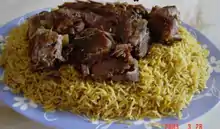Mandi (food)
Mandi (Arabic: مندي) is a traditional dish that originated from Hadhramaut, Yemen.[2] consisting mainly of meat and rice with a special blend of spices, cooked in a pit. It is popular and commonly consumed in most areas of the Arabian Peninsula, especially between the Yemeni people, and even considered a staple dish in many regions. It is also found in Egypt, the Levant, Turkey, Southeast Asia, and India.[3][4]


 Chicken Mandi | |
| Course | Lunch or dinner |
|---|---|
| Place of origin | Yemen |
| Region or state | Hadhramaut |
| Main ingredients | Rice, meat (lamb or chicken), saffron and a mixture of Hawaij[1] |


Etymology
The word "mandi" comes from the Arabic word "nada", meaning "dew", and reflects the moist 'dewy' texture of the meat.[5]
Technique
Mandi was usually made from rice, meat (lamb, camel, goat or chicken), and a mixture of spices called hawaij. The main technique that differentiates mandi from other meat dishes is that the meat is cooked in the tannour.
Dry wood (traditionally samer or gadha) is placed in the tandoor and burned to generate heat turning the wood into charcoal.
The meat is then boiled with whole spices until tender, and the spiced stock is then used to cook the basmati rice at the bottom of the tandoor. The meat is suspended inside the tandoor above the rice and without touching the charcoal. After that, the whole tandoor is then closed with clay for up to eight hours.
See also
References
- "Chicken Mandi | Unilever Food Solutions". Archived from the original on 2019-05-09. Retrieved 2019-05-09.
- Salloum, Habeeb (2012-02-28). Arabian Nights Cookbook: From Lamb Kebabs to Baba Ghanouj, Delicious Homestyle Arabian Cooking. Tuttle Publishing. ISBN 9781462905249.
- George, Anubha (9 March 2018). "How a Yemeni rice dish became Kerala's favourite biryani". Scroll.in. Retrieved 2023-04-03.
- George, Anubha (9 March 2018). "How a Yemeni rice dish became Kerala's favourite biryani". Scroll.in. Retrieved 2023-04-01.
- "Mandi on my mind". gulfnews.com. 11 July 2013. Retrieved Jun 5, 2021.